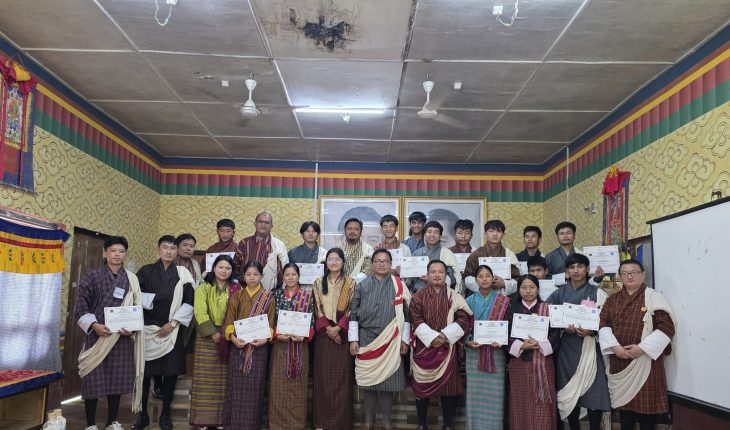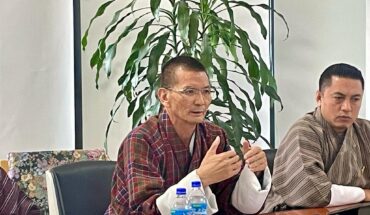The initiative is expected to tackle unemployment and spark rural innovation
KINZANG DORJI TSHERING | Thimphu
In an effort to tackle youth unemployment and inspire innovation at the grassroots level, the Dzongkhag Administration of Samtse, in collaboration with Sang-Ngacholing Gewog and the Startup Centre in Dhamdhum, has launched a 13-day Youth Entrepreneurial Training Program.
The initiative targets 16 out-of-school youth, equipping them with essential knowledge in business idea generation, financial literacy, marketing, and sustainable enterprise development.
The program aims to build confidence, promote self-reliance, and foster community-driven economic transformation.
Phata Singh Ghalley, Gup of Sang-Ngacholing Gewog, said the vision behind the program is to empower young people to become self-reliant and innovative.
He added the vision of Sang-Ngacholing Gewog in partnering for this program is to empower their youth with skills and knowledge that will make them self- reliant and independent.
“We want to inspire them to take initiative, innovate, and create meaningful livelihoods rather than depending solely on government employment,” he said.
He emphasized that the program is not merely about job creation but about nurturing leadership and confidence among young individuals.
“By encouraging entrepreneurial thinking, our vision is to nurture confident young individuals who can stand on their own feet, contribute positively to their families, communities, and the nation, and serve as role models for others,” said the Gup.
He highlighted the importance of entrepreneurship, especially in rural areas where opportunities remain limited compared to urban centres.
“Our gewogs have many energetic and creative young people who are searching for new opportunities but lack platforms to showcase their potential. Unlike in urban areas where youth may find diverse avenues, our rural youth face limited employment prospects. This makes entrepreneurship not just an option but a necessity,” he added.
Phata Singh Ghalley described the training supported by UNICEF Bhutan as a rare and valuable opportunity for local youth.
“We consider ourselves fortunate that such a program was conducted in our gewog, as it equips our youth to turn their ideas into action and ensures they do not get left behind compared to their peers elsewhere,” he said.
Every initiative, he added, is taken by the gewog, he added, is guided by the vision of bringing meaningful socio-economic change, and the youth training program aligns directly with that vision by providing practical knowledge and entrepreneurial skills.
With Samtse Dzongkhag witnessing rapid development and the rise of new industries, the Gup stressed that rural youth must be prepared to seize the opportunities that come with progress.
“If our youth can create businesses, generate employment, and provide services locally, it will strengthen our gewog’s economy and reduce dependency on outside resources,” he said.
He further assured that the gewog administration’s support would not stop at training but extend to helping participants apply their new skills in real life.
“After the training, the gewog administration will encourage and support youth to put their skills into practice,” said Phata Singh Ghalley. “We want to see them actively engaged in entrepreneurship rather than sitting idle, as an idle mind can be easily misled.”
To support this transition, the gewog will help connect them with relevant institutions and services.
“Our role will be to help them with linkages—connecting them to financial institutions, guiding them to relevant government schemes, or providing exposure to markets. We also intend to create platforms where young entrepreneurs can showcase their products, share their stories, and learn from each other,” he said.
Phata Singh Ghalley added that in the long run, the gewog aims to build a network of youth entrepreneurs who can support one another and collectively strengthen the local economy.
He noted that many young people in rural areas face challenges such as lack of awareness about entrepreneurship, absence of mentorship, and limited access to markets.
“Many young people may have ideas, but without mentorship, start-up capital, or exposure, thei dreams remain unrealized,” said Phata Singh Ghalley.
He added logistical and infrastructure-related issues also hinder entrepreneurial growth in rural regions. “
Despite these challenges, the community’s response has been overwhelmingly positive.
He said the strong community support gives them confidence that the youth who pursue entrepreneurship will be backed by their families and society at large.
On the issue of rural-to-urban migration, Phata Singh Ghalley stated that entrepreneurship could play an important role in addressing it. “Entrepreneurship can partly help reduce rural-to-urban migration, though not entirely,” he added.
He also believes that with the right infrastructure and policy support, rural life can be made more appealing and sustainable.
The Gup expressed appreciation to UNICEF Bhutan for supporting the program and called on gewogs to take greater ownership of similar initiatives in the future.
“UNICEF Bhutan has generously borne the costs of this training, while the gewog provided the necessary arrangements. Going forward, gewogs themselves must step up and create more opportunities for young people,” he said.
For many participants, the training has opened new perspectives and revived hope. Twenty-year-old Nima Gyeltshen Ghalley said the experience changed how he viewed his own potential.
“In our gewog, there are very limited job opportunities. After completing school, many of us are unsure what to do next,” said Nima Gyeltshen. “Unemployment is a big issue among youth here, but this training gave me new ideas and motivation. I now feel confident that I can start something of my own instead of waiting for a government job.”
He added that he plans to start a business promoting local products while creating employment for others. “It may be small in the beginning, but I believe with the right support and hard work, we can grow,” he said.
Similarly, 28-year-old Gow Raj Ghalley shared that the program transformed his perception of opportunities in rural areas. “After the elections and working for a while, I thought there wouldn’t be many opportunities here. But this training has completely changed my mindset,” said Gow Raj Ghalley.”
He said the program has encouraged him and other youth to think differently and take initiative. “If more such opportunities come, many youths will stop leaving their villages and instead start something here,” said Gow Raj Ghalley.
“With the right training and encouragement, we can start businesses and build our lives right here at home,” added Gow Raj Ghalley.




